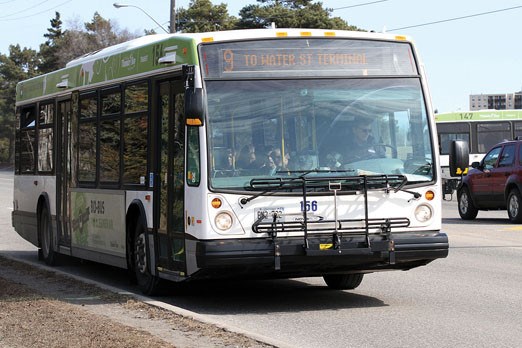THUNDER BAY – A pair of city councillors expressed disappointment Monday that massive investments in Thunder Bay Transit won’t be used to wean its fleet off of fossil fuels.
Coun. Andrew Foulds vented his frustration over city administration’s projection that a move to electric buses remains years away, as council approved a funding agreement that will see over $25.5 million spent to upgrade the local transit system by 2027.
Those improvements come through the Investing in Canada Infrastructure Program (ICIP), with costs split between the federal government ($10.4 million), provincial government ($8.5 million), and the City ($6.6 million).
The City of Thunder Bay is eligible for a total of $83 million in ICIP transit funding over the coming years under the federal plan, including the first phase of $25.5 million approved Monday.
That initial amount, announced in 2020, will be used to upgrade bus stops and transit hubs, purchase new buses, offer WiFi on board, introduce an electronic fare management system, and more.
Coun. Rebecca Johnson called the investment welcome news for the community.
“[It’s a] good way of spending overall, I’m quite impressed with that,” she said.
However, the at-large councillor questioned why the city wasn’t moving away from fossil fuels as it spends $4.9 million on new vehicles under the agreement.
“Why are we not thinking about electric?” she asked. “I mean, here’s an opportunity with this funding… to do something creative and different.”
General manager of community services Kelly Robertson told councillors the transit department had begun work on a plan to electrify its fleet, but the move hadn’t been deemed feasible when the city applied for the first phase of ICIP funding two years ago.
“The [Thunder Bay Transit] team is just starting to explore an electrification strategy,” she said. “At the time we submitted this application, which was back in 2019, the team didn’t recommend electrification, based on benchmarking neighbouring municipalities here in the north, and in the northern U.S.”
Questions over whether electric buses could withstand northern climates were one major factor in deciding to stick with diesel, she said, along with daunting infrastructure requirements like charging stations.
“We are working on it, but it’s still a few years away from us,” Robertson said.
That answer proved less than satisfying for Current River ward councillor Andrew Foulds, who said Thunder Bay now lags behind other Canadian cities on an important issue of municipal climate leadership.
Cities including Guelph, Toronto, Montreal, and Edmonton have recently moved to begin electrifying their fleets.
“I’m just so disappointed in the response,” Foulds said. “We’ve got to be closer than a few years away. Edmonton’s doing it… These excuses about cost and cold weather, I’m not buying them anymore.”
Developing a transit electrification strategy would be a priority action for 2022-2023 under the city’s “net-zero” strategy to reduce local greenhouse gas emissions.
The plan sets a target of fully electrifying the Thunder Bay Transit fleet by 2035, but still requires council approval, with a vote expected on June 7.
Foulds worried the city was missing a major opportunity to begin making that transition by doubling down on diesel.
City council had directed administration to examine the possibility of electric buses as early as 2008, Foulds said.
“At the time, the answer was, ‘well, it’s too expensive,’” he said. “Now we’re getting a large infusion of cash.”
Electric buses cost more up front but would save money over their lifetime, he said.
Mayor Bill Mauro said he appreciated the sentiment, but it was far too late to consider changes.
“I think a number of the points that have been made this evening are relevant and important, but these are projects that we’ve submitted that have been approved,” he said. “What’s in front of us tonight is simply the approval of the transfer payment agreement… I think the conversation’s wandering off in a different direction.”
The issue had come to council before, he pointed out, with a report presented in May of 2019 outlining the projects the city planned to submit for ICIP funding.
Reached Tuesday, Robertson said city staff were seriously investigating the potential move to electric buses. The federal government has not yet released details on when the next phase of ICIP transit funding will roll out, but she said it was likely to be in the next "couple of years."
She hopes the City will be in a position to submit a plan to for electrification by that time.
The $25.5 million approved Monday includes $8.2 million for transit hub improvements, $4.9 million for conventional and specialized fleet expansion, $2.6 million to implement an electronic fare management program, $2.2 million for new pedestrian crossovers connecting to transit stops, $1.9 million for bus stop improvements, and $1.4 million for other upgrades for pedestrians.
Those numbers will result in very real improvements for riders, said Coun. Brian Hamilton.
“There’s a very incredible amount of upgrades that are happening to transit,” he said. “These are going to be notable for transit users.”
Councillors voted unanimously to approve the funding agreement.
